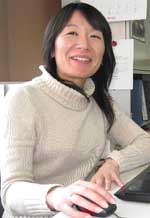Conflict and Peace -- Looking for Answers Rumiko Seya
 Rumiko Seya
Rumiko Seya
Born in Gunma Prefecture in 1977. Graduated from Chuo University and received an MA in Conflict Resolution from the University of Bradford in the UK. Specialist in post-conflict peacebuilding and reintegration of ex-combatants into society. In the past she held various positions in conflict areas, such as NGO staff (Rwanda), UN volunteer (Sierra Leone), Special Assistant to the Ambassador (Japanese Embassy, Afghanistan), and UN Peacekeeping Operations staff (Côte d'Ivoire). She became Secretary General of the JCCP in April 2007.
Hello, everyone. I'm Rumiko Seya, Secretary General of the Japan Center for Conflict Prevention (JCCP), and I'm going to be in charge of this new column about conflict and peace in the world. JCCP is a non-governmental organization (NGO) working on projects to prevent the occurrence of conflict in Asian and African countries. We do this through such activities as collecting the weapons that remain after armed conflicts, providing vocational and skill-development training, and offering services for rural development. In an effort to prevent further conflicts, we also offer training in peacebuilding for both local people and international experts who are engaged in development work.
I became interested in issues of conflict and peace when I was a high-school student. I saw a photograph (below) of a Rwandan refugee child trying to wake up his sick mother. Although there seemed to be only a camera separating me from that child, there was a great difference in our situations. That raised a lot of questions in my mind about how the whole world is structured and how it functions. This motivated me to look for ways to prevent conflicts. Since then I have studied conflict resolution in graduate school in England, and I have worked in various areas of conflict such as Afghanistan and some countries in Africa.


When you hear the word "conflict," what thoughts come to your mind? You may immediately get a negative feeling, or you may think of situations in Iraq or Africa that you have seen on TV or in a newspaper.
What about the word "peace"? What image do you see? In areas of conflict around the world, many people have recognized similarities between their own situations and Hiroshima's experiences with war and the bomb. Some think of Hiroshima and Japan, which were completely reconstructed after the war, as symbols of peace and revival, and they may ask us for advice in rebuilding their own countries.

|
| In a refugee camp on the outskirts of Goma, Zaire (now the Democratic Republic of the Congo) in July, 1994, a child belonging to the Hutu majority of Rwanda tries to wake his mother, who is in a coma due to illness. (AP, Kyodo Press) |


For the first issue of this new column, I would like you to consider a question that is often used in training courses in conflict resolution. Conflict doesn't always occur in some faraway place. Whenever two people have different opinions, conflict can occur. We may be able to find hints in our daily lives to help us prevent or resolve these conflicts.
In this column, I'd like to introduce what is happening in real situations of peace and conflict including some dilemmas we face. I hope this will be an opportunity for us to consider some answers to these questions together.
Please feel free to send us your opinions on these issues and your answers to our questions, making full use of your hearts and minds.
|
Today's question: |
|
Two people are scrambling for one orange. Both insist that half the orange is not enough; they need the whole orange, and they refuse to concede. How can you settle their dispute?
(Entries have already closed.)
|